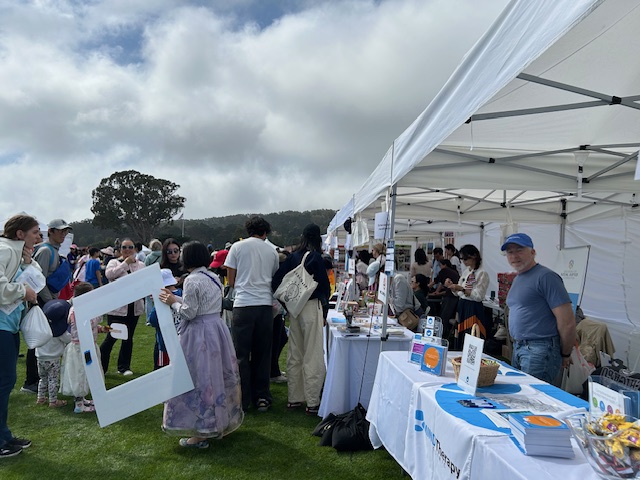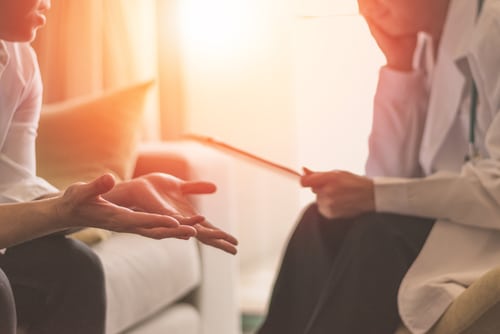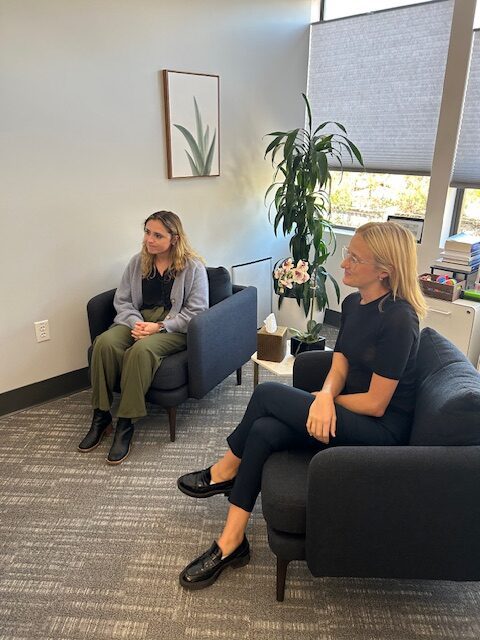Mind Therapy Clinic’s new one-day TMS protocol is designed to make TMS treatment faster, more affordable, and overall more accessible.
Continue readingTMS is now included with IOP
We are excited to announce the inclusion of Transcranial Magnetic Stimulation (TMS) as an integrated part of our intensive outpatient programming at MTC. While TMS has previously been offered as an adjunct service, it is now a core component of the program.
TMS is a natural, holistic treatment approach for a variety of mental health conditions, including depression, anxiety, and OCD. By adding TMS, we are expanding our already comprehensive list of included services, which features:
- Individual therapy
- Family therapy
- Group therapy
- Psychiatric evaluation and medication management
- Case management
- Nutrition consultation
Initially recognized for helping individuals who did not respond to multiple medication trials or who experienced severe side effects, TMS has demonstrated benefits for those diagnosed with:
- Treatment-resistant depression
- Post-traumatic stress disorder (PTSD)
- Anxiety
- Obsessive Compulsive Disorder (OCD)
- Chronic pain
- Bipolar disorders
This addition reflects our commitment to maintaining the highest quality of care by offering the latest proven technologies and treatments to our clients.
Behavioral Health Friendsgiving
Celebrating Community at the Behavioral Health Friendsgiving – Nov 18
Mind Therapy Clinic is honored to participate in the 3rd Annual Friendsgiving Potluck for Behavioral Healthcare Professionals on Monday, November 18, from 12:00 – 2:00 p.m. at Lagoon Park in San Rafael.
Friendsgiving has become a simple tradition we love – sharing food, stories, and thanks with colleagues who care for our community every day. There’s no program and no agenda. Just a table full of potluck dishes and a chance to connect across agencies, roles, and disciplines.
This year’s gathering is a collaboration among Mind Therapy Clinic, Crownview Psychiatric Institute, Foundations San Francisco, and CPN Wellness / Doyen Consulting. We’re grateful to stand alongside so many dedicated professionals – clinicians, case managers, program teams, trainees, and partners – who support individuals and families facing mental health and substance use challenges across the Bay Area.
What Friendsgiving means to us
Gratitude: making space to appreciate the work and one another.
Collaboration: strengthening relationships that make care more seamless for patients.
Community: showing up as neighbors, not just organizations.
If you’re a behavioral health professional and plan to stop by, there’s a simple RSVP below that helps with headcount. Attendance is entirely informal; bring a dish if you’d like, or simply bring yourself.
RSVP
Date/Time: Monday, Nov 18 • 12-2 p.m.
Location: Lagoon Park picnic tables, San Rafael
From all of us at Mind Therapy Clinic: thank you for the meaningful work you do and for the spirit of community that makes that work possible. We’re looking forward to sharing a meal together.
Webinar: Bridging the Gap
Bridging the Gap: Integrated Treatment for Trauma & Addiction
Free 2-CE Webinar
Date/Time: Monday, November 17 • 11:00 a.m. – 1:00 p.m. PT
Format: Live Zoom webinar (link provided after registration)
CE Credit: 2.0 hours (no cost; attendance verification required)
Register here to watch the recording
Overview
For many years, treatment for substance use disorders and trauma followed a sequential model – address one problem first, then the other. That approach often produced incomplete care and outcomes. Today, research and clinical experience point to a more effective path: integrated treatment.
In this practical, evidence-informed session, Tim Worden, Ph.D. and Matt Blagys, Ph.D. will:
- Ground participants in the neurobiology of addiction and trauma.
- Explain the bidirectional influence each has on the other.
- Translate these insights into integrated assessment and treatment strategies you can use now.
Learning Objectives
Participants will be able to:
- Identify the primary neurochemicals and brain structures involved in addiction.
- Describe how trauma impacts the nervous system.
- Explain the bidirectional relationship between trauma and addiction and implications for integrated treatment.
Who Should Attend
Psychiatrists, psychologists, therapists, social workers, counselors, and other clinicians who treat co-occurring trauma and substance use disorders.
Presenters
Tim Worden, Ph.D.
Speaker

Tim Worden, PhD, is a licensed clinical psychologist and neuropsychologist, specializing in addictions and health psychology. He developed a unique psychotherapeutic approach called Neuro-Emotional Therapy (NET), which emphasizes the neurologically based emotional-motivational factors involved in change.
Dr. Worden received his doctorate from the University of South Florida over 25 years ago. His work in substance abuse includes inpatient (Palo Alto VA), outpatient (Linn County Drug & Alcohol Program), and several residential treatment centers as a staff psychologist, including clinical director positions at New Seasons Recovery and Summit Malibu. He has been a visiting assistant professor in the Department of Clinical Psychology at the University of Florida focusing on pain management and neuropsychology, as well as the clinical director of a neuro-rehabilitation program where he functioned as a neuropsychologist and rehabilitation psychologist for 10 years.
During this time he developed his unique psychotherapeutic approach called Neuro-Emotional Therapy (NET), which emphasizes the neurologically based emotional-motivational factors involved in change. He has dove-tailed this therapeutic approach with advanced training in Emotionally Focused Therapy (EFT) and Dialectical Behavior Therapy (DBT), which emphasize emotional regulation. He has co-authored several articles on anger, anxiety and health, and has developed the Life Satisfaction Questionnaire, the Human-Styles Questionnaire, the Values Clarification Inventory, and co-authored the Work Attitudes Inventory, which focuses on Integrity in the Workplace. He is completing books on eliminating guilt and shame, relapse prevention: a motivational approach, and life satisfaction.
Matt Blagys, Ph.D.
Speaker
Matt Blagys, Ph.D., is a clinical psychologist with advanced training from Harvard/Mass General and the Austen Riggs Center. He specializes in complex psychiatric and addiction cases and serves as the clinical director at Mind Therapy Clinic. Click here for more.
Continuing Education
Information on Continuing Education Credit for Health Professionals
• CE credits for psychologists are provided by the Spiritual Competency Academy (SCA) which is co-sponsoring this program. The Spiritual Competency Academy is approved by the American Psychological Association to sponsor continuing education for psychologists. Spiritual Competency Academy maintains responsibility for this program and its content.
• The California Board of Behavioral Sciences accepts CE credits for LCSW, LPCC, LEP, and LMFT license renewal for programs offered by approved sponsors of CE by the American Psychological Association.
• LCSW, LPCC, LEP, and LMFTs, and other mental health professionals from states other than California need to check with their state licensing board as to whether or not they accept programs offered by approved sponsors of CE by the American Psychological Association.
• SCA is approved by the California Board of Registered Nursing Provider CEP16887) for licensed nurses in California. RNs must retain their certificate of attendance for 4 years after the course concludes.
•For questions about receiving your Certificate of Attendance, contact Jacqueline Perlmutter, Mind Therapy Clinic. For questions about CE, contact Spiritual Competency Academy at info@spiritualcompetencyacademy.com.
Fall News
|
Celebrating Chuseok: Asian Mental Health
This past weekend, Mind Therapy Clinic was honored to join the 7th Annual Bay Area Chuseok (Korean Harvest) Festival at the Presidio Main Parade Lawn: a vibrant community celebration of Korean culture, food, music, and connection hosted by Korean Center, Inc. The festival welcomed families, students, and neighbors across generations for a joyful day under the clear fall sky.
At our booth, our team connected with the Asian community who stopped by to talk about Asian American mental health, ask questions, and pick up resources. Many shared stories about young people juggling academic pressure, identity, and belonging – conversations that echo what we see in our clinics and in recent research on AANHPI (Asian American, Native Hawaiian, and Pacific Islander) youth.
Why show up at a cultural festival to talk about mental health? Because community spaces like Chuseok bring down walls. They make it easier to start real conversations about stress, stigma, and support right where families already gather.
Why this matters
- Nearly 1 in 2 AANHPI youth (48%) screen at or above moderate depression on a standard PHQ-9 measure; an indicator that usually warrants a treatment plan and follow-up.
- 93% report experiencing at least one race-based discriminatory incident in the past year, which the study links to negative mental health impact.
- For Asian American youth ages 15–24, suicide is the leading cause of death; a stark reminder that we must keep showing up, listening, and connecting young people to care.
At the same time, there are bright spots we can build on:
- Over half (53%) of AANHPI young people say they feel comfortable talking to their parents or caregivers about a tough time – showing that family conversations can be a powerful entry point.
- Youth consistently point to friends and community spaces as helpful supports – exactly the kind of connections that blossom at festivals like Chuseok.
(Data collected by The Asian American Foundation (TAAF) through the 2024 Beyond the Surface youth mental health report.)
What we shared
Throughout the day, we offered:
- Relevant information about what the main causes and issues are regarding mental health
- New treatments being offered for any young adult patients interested in our clinic
- Local and virtual referral pathways: clinicians, groups, and crisis resources
- A psychiatrist on site for anyone that wanted to have a conversation about their mental wellness
We also spotlighted how community wellness spaces – from cultural festivals to peer groups – rank among the most desired supports for young people, right alongside accessible, culturally knowledgeable professionals.
Keep the conversation going
If you or a young adult you love is navigating stress, identity pressures, or anxiety, we’re here. Mind Therapy Clinic provides culturally informed care for youth and families – including individual therapy, group programs, and care coordination tailored to your needs.
Reach out to learn more or to schedule a consult. Together, we can nurture resilience, belonging, and hope: one conversation at a time.
Relapse Prevention Skills Group Therapy
This group therapy is grounded in science and delivered in a structured, informative way that combines education with discussion and skills practice.
Continue readingDrs. Gustafson and Lucitt, MTC’s 2025-26 Postdocs
Dr. Lauren Lucitt and Dr. Wallace Gustafson MTC’s 2025-26 Postdoc Fellows
Continue readingThe Role of the Nervous System in Trauma Healing
When we talk about trauma, we often think about emotions and memories. But healing isn’t only about what we think or feel—it’s also about how our nervous system responds.
In our recent webinar, When Trauma Recovery Stalls: What’s Next?, Dr. Kelly Callahan and Dr. Sarah Dropman explored how understanding the nervous system can unlock new pathways for healing. They pose the question for clinicians, “am I supporting the client’s nervous system?”
Trauma Lives in the Body
Trauma isn’t just something that “happens in the past.” It can leave lasting imprints on the nervous system, shaping how the body responds to stress, relationships, and everyday challenges. To start the process of checking in with the nervous system, it can be helpful to reflect on what is happening in the “here and now.”
For example:
- Some people find themselves in a state of high activation, called hyperarousal. This could look like an elevated heart rate, feelings of anxiousness or panic, racing thoughts, or hyper-vigilance.
- Others fall into a state of low activation, hypoarousal. This could look like lethargy, numbness, depression, or brain fog.
- Many oscillate between the two.
These two states are the body’s survival strategies, designed to protect us when things feel overwhelming. They are integral parts of the Polyvagal Theory, a framework that allows us to better understand the functional responses of the nervous system.
The Window of Tolerance
Another important part of Polyvagal Theory is the window of tolerance, which
describes the “zone” between hyper- and hypoarousal where we feel balanced and engaged.
- Inside the window, we are at an optimal state of arousal. We can think clearly, manage emotions, and connect with others.
- Outside the window, we tip into hyperarousal or hypoarousal.
Therapy often focuses on helping clients expand their window of tolerance—so they can stay regulated as they work through trauma.
Supporting the Nervous System in Recovery
It’s valuable in trauma recovery to use techniques that recognize the body’s role in healing. The goal is to help clients regain flexibility and choice, bringing them back into the window of tolerance. Supporting regulation can take place in many different areas, and may include practices like the following.
- Somatic. Movement, orienting within the room, or completing a breathing exercise.
- Intellectual. Reading, writing, learning something new, or a different creative task.
- Relational. Visualization of a safe individual, a hug, or connection with an animal.
- Nature. Walking in the grass or looking and listening out the window.
- Spiritual. Prayer or yoga.
Moving Toward Healing
Understanding the nervous system is more than science—it’s hope. When clients understand their responses as functional survival strategies, shame begins to ease. From there, healing becomes possible, and trauma work can progress.








-1.png?width=320&upscale=true&name=Pic%20(2)-1.png)
.jpeg?width=322&upscale=true&name=unnamed%20(2).jpeg)
.jpeg?width=320&upscale=true&name=shutterstock_2126740931%20(1).jpeg)






